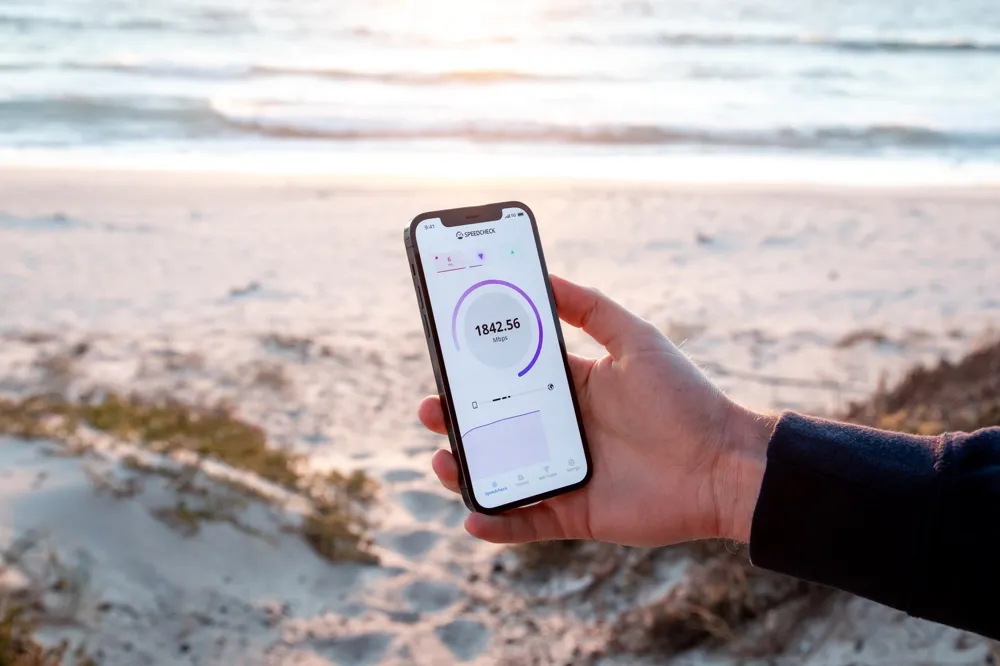What are the benefits of a workation?
The world is going through a profound shift — with more and more people gaining the ability to work remotely. The explosion in remote work has led to the rise of the workation — a concept where people make a short-term or medium-term relocation to a desirable travel location while continuing to work full-time.
With vacations, it's assumed you're going to be "going offline". You change your email responder to say "I'm on vacation". You make a plan and pack your days with excursions and relaxation time to 'make the most of it'. Maybe you actually wouldn't mind getting some work done, but — hey — you're on vacation.
And while you are on vacation (if you are an employee — rather than a freelancer or entrepreneur) you are using up precious "vacation days".
But sometimes the thought enters your mind — "I don't actually need to be relaxing or exploring every day. I wish I could just live here, and go through a normal routine like the locals do!"
You or your family might be a good candidate for a 'workation'.
Let's dive into over a dozen key aspects of travel planning that anyone who is thinking of taking a workation should consider.
Choose your destination based on your workation criteria
Legality
Workations can be anywhere you want them to be — with a few caveats.
It's important to realize that even though remote work has become very popular, it doesn't mean it's a free-for-all.
Pick destinations that are explicitly amenable to people arriving and working.
We do recommend that people check out legal remote work options in Costa Rica or Croatia, for instance.
On the other hand, we DO NOT recommend that non-US citizens travel into the USA and work without a visa.
If you are traveling within your own country, or for EU citizens traveling around the EU, you generally are allowed to work anywhere legally — your employer
If you are an entrepreneur or freelancer, you have more freedom, but you still want to be careful and possibly consult a tax adviser.
Weather
Many countries are known to have great weather, and that may be a big draw for you. Always check what the actual weather is like during the months you want to go. Some year-round tropical destinations, for instance, have wet and dry seasons — and you may be in for unwanted storms if you didn't check out what the local weather was like at the time you were planning to arrive.
Remote Worker Communities
Depending on your life situation, you'll want to figure out what is the right approach to finding a local community.
If you have a growing family, you may need spacious accommodations and even options for remote school (on-site or online).
If you are traveling with a close partner or spouse — you may just want to spend time with each other but have the occasional opportunity to socialize with like-minded couples.
And if you are single — well, you may just want to find out where there is a critical mass of other remote workers/locals hanging out, so you can make new friends 😉.
Joining Facebook groups, Slack groups and watching video reviews is a great way to learn what the community is like in a given area.
Sometimes, an entire village or town can grow into a small purpose-built destination for remote workers looking to connect.
Examples include communities in Madeira and Belize that were specifically created around communities of like-minded digital nomads and remote workers.
Shop for accommodations that are right for you

The workation is a new concept, and the short-term rentals market is still catching up to accommodate this new niche. There are quite a few options for accommodations, and it's a growing sector of the economy. Here are a few choices that may be of use in planning your stay:
Nomad Stays

Do you ever book in somewhere, having used one of the more notable short-term-stay sites, and realize that maybe the advertised "high-speed Wi-Fi" ain't so fast... and the "dedicated desk space" is just an uncomfortable table with a crappy stool?
Nomad Stays knows that you need reliable Wi-Fi, a dedicated workspace, transparent pricing, and no weird surprises. They curate each stay to be ready for remote workers to move in.
Flatio
Flatio is a growing platform and focuses on longer stays within the UK and EU.
Anyplace
Anyplace is generally US-focused and suitable for Americans. Remember, we never suggest working without a visa in the USA!!

If you furnished apartments or extended-stay hotels might be up your alley, then Anyplace might be up your alley. Unfortunately, they are focused only on a few major US cities, meaning selection is limited for global remote workation destinations.
Love Home Swap
Thinking about maybe swapping your home? Love Home Swap takes a different approach by facilitating the classic home-swapping model with a home exchange platform.

The Classics
If you just want to open up a worldwide platform and start looking for general remote worker accommodations, Airbnb, VRBO and Selina are also good sites you can use to broaden your search.
Make a budget and research the local cost of living

The local cost of living is a big deal! One of the obvious benefits of a workation is that income is still rolling in, even if you aren't using vacation days as an employee (or slowing down your productivity as an entrepreneur).
You can keep that money rolling in, and maybe even plan to go somewhere with a generally lower cost of living for a while! "Geo-arbitrage" is what they're calling it!
Three months in Mexico, Costa Rica, or Bali is not going to cost you the same as living in a major developed city in the West.
Of course, there are airline flights to consider, so it's important to consider the total cost of the trip.
Create a Google Sheet, Excel spreadsheet, or Numbers document — whatever your tool of choice is for spreadsheet-ing — and think about all the things you will need to spend money on. Then, you can use resources like Nomadlist to estimate the cost of living for you, your partner, and/or your family and see what the entire trip might cost you, all-in.
Plan ahead for a productive workspace
This one is CRUCIAL. You may feel you have all the jigsaw pieces in place — but if you get up Monday morning, and something's off that gets in the way of you productively getting work done (or ruins a virtual meeting) — it can impact your whole trip.
You will want to choose whether you will be working from a dedicated workspace at home or planning to get a pass at a nearby coworking space (or both).
You will want to ask potential long-term coworking spaces at least some of the following questions:
- What is the Wi-Fi speed?
- Is the open area the coworking space provides somewhere that I'll actually be able to work quietly?
- Do you play music in the common area or not?
- Are there meeting rooms that can be booked for free?
- If meeting rooms are not free, how much do they cost and how often are they available?
- Do you have small, isolated phone booth-style areas to take a soundproof call?
- What hours are you open?
- Is there a way to access the facilities 24/7 with a fob/card, or is it inaccessible during closing hours?
- What is the temperature like and is there A/C (or fans) in warmer destinations?
- Are you a single location, or are there other locations within the same brand I can access elsewhere?
Pack the right set of personal items
Remember, especially if you are travelling abroad, you may not have all the same amenities automatically with you when you get there. Make a checklist of what you want to bring. Here are a few items to kick off your list:
- Passport
- Cash, debit, and credit card. We also recommend checking out Wise for a Mastercard that can be managed digitally and used at retail registers flexibly in dozens of different currencies.
- Adapters and chargers that fit the electrical sockets of the country you are going to
- Sunscreen! Stay skin-healthy wherever you go!
- Headphones, earplugs, pillows, and eye-masks for the flight
- Different sets of shoes for the terrain you will encounter
- Health insurance, drivers' license, vaccine, and visa documents with backups stored digitally
- Extra underwear— always.
- We also always recommend bringing EXTRA USB-C cables, USB-A to USB-C hubs, HDMI cables, and a few more goodies, just in case your coworking space has an extra monitor — or if you want to just leave one charger always plugged in at home and another one in your laptop case while on-the-go
Book health and travel insurance
Health and travel insurance can be complicated. A word of warning — most traditional health and travel insurance packages are fundamentally not designed for people taking workations. The policies were created before remote work was popular and the terms of the policy are not favorable to people who aren't just going on vacation.
We recommend nomad- and remote worker-oriented travel insurance companies like Insured Nomads and SafetyWing. Insured Nomads is and has been a trusted partner of RemotelySerious.com — so we encourage you to check them out and DYOR ("Do Your Own Research")
Let's break down the logic of why you should consider remote worker-specific insurance:
- Traditional health insurance companies act more like "emergency insurance". They will pay the minimum for local treatment and assume if you have any kind of health need above the basic level, that you will abandon your trip and fly back to your home jurisdiction to get your treatment. If you are on an extended workation, you may simply want to sleep soundly knowing that you can get quality care locally.
- Traditional health insurance companies haven't built up local relationships with health care providers for the reasons stated above. Companies like Insured Nomads can cover health needs as broad as childbirth, diabetes care, and chemotherapy. If you are going on a four-month workation, you may have long-term health care needs you don't want to sacrifice by going away.
- Nomad-friendly health insurance providers understand and offer secondary and ancillary types of insurance (travel interruption, cancellation, theft, political unrest, prescription drugs, vision, dental, etc...) with a global outlook that stodgier providers might not be able to match
Contact your lodging and coworking space to confirm your requirements

Remember when we talked about accommodations and coworking space? Well, uh, there's just... one more thing that we recommend.
Contact the lodging and or coworking space — and make them send you a valid speed test for Internet speeds. Get in writing by email that they will refund you if the Internet is chronically down or slower than advertised. With most reputable coworking spaces, you should be okay and maybe not need to go this far (especially if there are other coworking spaces in town you can try out).
But for random Airbnbs and accommodations — once you have booked a month-long accommodation (or longer) it is a bit painful and hard to change — so really hold them accountable. Ask for that speed test screenshot!
Plan the workstation items you need to bring, lease or buy
The reality is, it's not practical to bring a dual-monitor setup, giant comfy computer chair, large keyboard, and special standing desk in your carry-on luggage. But if you are going to be working for weeks and months in a new location — you might want to think about how you can replicate a productive, ergonomic, and comfortable office setup, to avoid hunching over a laptop for a month or more.
Some people need to or want to work with a more expanded desk setup, including a large, high-resolution external monitor and proper chair.
In any event, you may want to ask yourself or plan in your budget for what workstation items (monitors, computer chairs, external keyboard, webcam...) you will (a) take with you (b) buy at a retail location once you get there or (c) see if your accommodations or coworking space can provide for free or for a small fee.
(By the way... we recently talked about an interesting company that may be making this easier.)
Consider a remote work or digital nomad visa
Have we stressed this enough? These aren't the Wild West under-the-table days of 2007 or even 2019. At Remotely Serious, we NEVER suggest just heading off somewhere and operating in a total grey zone legally.
If you are going abroad, we've created a comprehensive list of over 60 countries that legally allow you to work (often for up to 1-2 years) within their borders. No funny business. No pretending you are just "going on vacation". Have a look, it's surprising how much is possible — and how open the world has become since 2021.
Prepare your necessary travel documents
Countries have been dropping covid-related requirements, but it's always helpful to make sure you have a digital and physical copy of your vaccine passport if you are vaccinated.
Take backups of your passport and birth certificate and store them digitally and/or physically back home — and take copies with you.
If you happen to be getting an actual visa, make sure to do that ahead of time and keep all of the visa documents handy with you (PDFs at your fingertips on your phone, and paper copies to be extra careful) as you go over the border.
If you are used to going on vacation somewhere that waives a visa requirement or makes getting a visa as easy as a quick stamp, you may want to be ready for a few more questions than you are used to — if you are entering on a remote work visa or digital nomad visa. Border conversations can be a little longer when you are getting a formal visa entry approved. You may want to have things like your proof of income handy if proving your income was something you did while obtaining your visa.
Inform colleagues, supervisors, and/or clients (as necessary)
OK, this one's really up to your discretion, boys and girls. Depending on your personality and the nature of your work, you may want to head down to the tropics or a similar time zone and pretend like nothing changed — set a fake Zoom background and just keep on truckin'.
But if you are going to have a major time zone change, it is almost certainly necessary to communicate your new reality to your colleagues, supervisor, clients, etc.
Also, for those with employers, you certainly should never simply relocate to a new country (or even state or province) for an extended time without telling them.
Our advice is to be up-front about it, and let your employer know. Spoiler alert: they may not be 100% thinking about all the exploration and cultural growth you are going to experience — their minds will turn to compliance, payroll, and tax liabilities. Be ready for this. They may in fact "say no".
Here's our hot take on what to do if your employer forbids you to go on a workation: start looking at companies that hire remotely. Maybe your current employer is not compatible with your desire to have a workation. Every week, more and more companies are letting their employees work from anywhere in the world. You have choices.
Plan excursions for your evenings and weekends...
Ok, so the fun part! There are entire guidebooks written about this part — and too much us to summarize in one little section!
Suffice to say, you should research what kinds of things you want to do in the evenings and on the weekends and make the most of the time you have at your workation destination!
...and consider tacking on a REAL vacation at the beginning or end
Maybe this is obvious... but here's our final thought. If you are planning to go somewhere for two or three months and you have vacation days available — tack on a REAL vacation!
As you conduct your workweek in a novel and stimulating new environment, you are bound to start creating a mental list of activities, excursions, and day trips that require a bit more time and separation from work obligations and work communications.
If you are feeling ambitious and want to give yourself more space — tack on that actual work-free vacation at the beginning or end of a trip and explore your workation destination with even more freedom. After all, you're already there!





